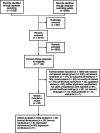Indicators associated with job morale of physicians in low- and middle-income countries during the COVID- 19 pandemic: a systematic review and meta-analysis
- PMID: 40346581
- PMCID: PMC12063427
- DOI: 10.1186/s12913-025-12699-5
Indicators associated with job morale of physicians in low- and middle-income countries during the COVID- 19 pandemic: a systematic review and meta-analysis
Abstract
Background: The COVID- 19 pandemic has placed immense strain on healthcare systems around the globe, with low- and middle-income countries facing unique challenges due to limited resources and fragile healthcare infrastructures. This systematic review and meta-analysis aims to define the levels of four indicators of job morale (job motivation, job satisfaction, burnout, and depression symptoms) among physicians working in public healthcare settings in low- and middle-income countries.
Methods: A comprehensive search of Scopus, PubMed, Embase, Web of Science, the Cochrane Library, and grey literature was performed. Studies were eligible if at least one job morale indicator (job motivation, job satisfaction, burnout, or depression symptoms) was assessed using quantitative methods, and at least 50% of the sample were qualified physicians working in low- and middle-income countries during the COVID- 19 pandemic. Random effects meta-analyses, planned sub-group analyses, and meta-regression were performed.
Results: Overall, 82 studies involving 65,431 participants across 26 middle-income countries met the inclusion criteria for the review. The pooled random effect estimates of the prevalence of burnout suggest that 49% of physicians working in middle-income countries during the COVID- 19 pandemic suffered from professional burnout. The overall estimate of the mean was 24.64, which also indicated a high level of burnout. The pooled random effect estimates of the prevalence of depression symptoms varied from 41 to 58%, depending on the adopted scale. Sufficient data were not available for meta-analyses of job motivation and job satisfaction.
Conclusions: The findings suggest that job morale among physicians working in middle-income countries was generally low during the COVID- 19 pandemic. However, due to substantial variation and limited methodological quality among the studies included, any conclusions offered should be approached with caution. Future research should focus on assessing job morale in low-income regions and identifying effective resilience strategies to support interventions aimed at improving job morale.
Keywords: Burnout; COVID-19 pandemic; Job morale; Low- and middle-income countries; Systematic review.
© 2025. The Author(s).
Conflict of interest statement
Declarations. Ethics approval and consent to participate: Not applicable. Consent for publication: Not applicable. Competing interests: The authors declare no competing interests.
Figures













Similar articles
-
Indicators Associated With Job Morale Among Physicians and Dentists in Low-Income and Middle-Income Countries: A Systematic Review and Meta-analysis.JAMA Netw Open. 2020 Jan 3;3(1):e1913202. doi: 10.1001/jamanetworkopen.2019.13202. JAMA Netw Open. 2020. PMID: 31922555 Free PMC article.
-
Job morale of physicians in low-income and middle-income countries: a systematic literature review of qualitative studies.BMJ Open. 2019 Dec 3;9(12):e028657. doi: 10.1136/bmjopen-2018-028657. BMJ Open. 2019. PMID: 31796473 Free PMC article.
-
A mixed method exploration of job morale of physicians working in public healthcare settings in Kazakhstan during the COVID-19 pandemic.J Health Popul Nutr. 2025 Jan 2;44(1):1. doi: 10.1186/s41043-024-00732-y. J Health Popul Nutr. 2025. PMID: 39748439 Free PMC article.
-
Job morale of physicians and dentists in Kazakhstan: a qualitative study.BMC Health Serv Res. 2022 Dec 10;22(1):1508. doi: 10.1186/s12913-022-08919-x. BMC Health Serv Res. 2022. PMID: 36496368 Free PMC article.
-
Occupational burnout and job satisfaction among physicians in times of COVID-19 crisis: a convergent parallel mixed-method study.BMC Public Health. 2021 Apr 28;21(1):811. doi: 10.1186/s12889-021-10897-4. BMC Public Health. 2021. PMID: 33906619 Free PMC article.
References
-
- Warr P. AQThe measurement of Well-Being and other aspects of mental health. J Occup Organ Psychol. 1990;63(3):193–210.
-
- Warr P. Work, happiness and unhappiness. NJ: Lawrence Erlbaum Associates; 2011. p. 1–548.
-
- Bakker AB, Demerouti E. The job Demands-Resources model: state of the Art. J Managerial Psychol. 2007;22(3):309–28.
Publication types
MeSH terms
LinkOut - more resources
Full Text Sources
Medical
Miscellaneous

